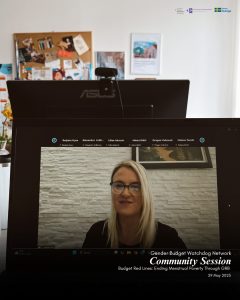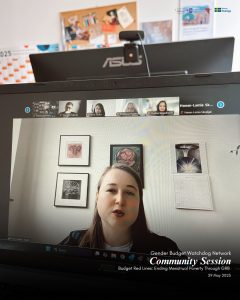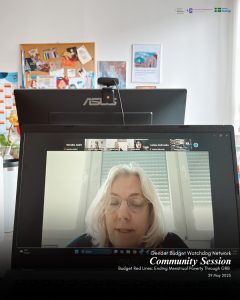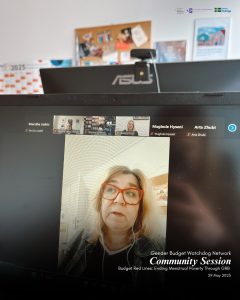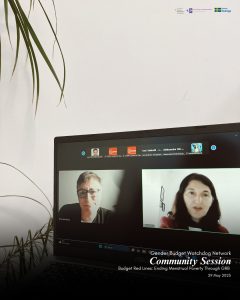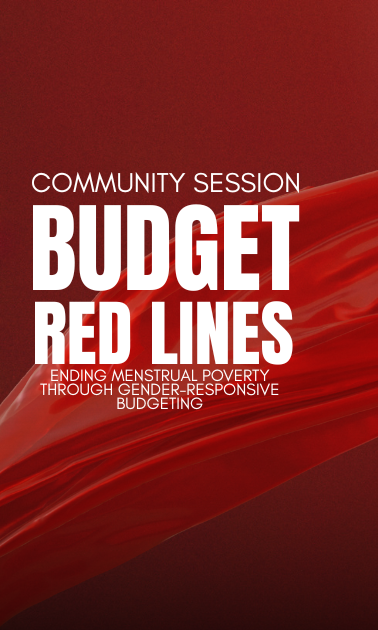Date: May 29, 2025 | Time: 14:00–16:00 CET
Speakers: Jelena Ružić, Marina Šakotić, Daniela Šakota, Nataša Dokovska, and Magbule Hyseini
In May 2025, the Gender Budget Watchdog Network hosted a powerful and timely community session titled Budget Red Lines, focusing on how gender-responsive budgeting can address the deeply rooted issue of menstrual poverty. The session gathered civil society experts, researchers, and activists from the Western Balkans—including Serbia, North Macedonia, Kosovo, and Montenegro—to examine how budgeting processes can be made more inclusive and responsive to the needs of menstruating individuals, particularly those from marginalized groups.
Centering Menstrual Equity in Budget Planning
A recurring theme throughout the session was that menstrual poverty is not simply a matter of limited access to hygiene products—it is a structural issue reflecting broader gender inequality, policy neglect, and institutional silence. Panelists highlighted that stigma, lack of education, and the invisibility of menstruation in public policy contribute to poor health outcomes and social exclusion, especially among women and girls from vulnerable communities.
Despite increasing awareness and activism, public budgets across the region have largely failed to recognize menstrual health as a legitimate area of public concern. Data from Kosovo, for example, reveals that up to 40% of women in low-income households cannot afford menstrual products. In Serbia and Montenegro, although digital feminist activism has made significant strides in challenging stigma, there is still a lack of targeted funding and policy support. North Macedonia faces similar obstacles, with civil society organizations often stepping in to fill the gap.
Bridging Research, Advocacy, and Budgeting
Speakers shared evidence-based advocacy efforts and community-level initiatives that aim to bring menstrual equity into the budgeting agenda. These included grassroots campaigns, student-led initiatives to provide free menstrual products, and collaborative efforts to integrate menstrual health into education and healthcare policy.
Participants emphasized that one of the most effective ways to make menstrual needs visible in public budgets is through civil society advocacy informed by local data. Organizations such as the Gender Knowledge Hub and local women’s groups are playing a critical role in translating lived experiences into policy recommendations—many of which remain unimplemented due to lack of political will or budget allocation.
Institutional Barriers and the Role of Civil Society
The session also shed light on persistent barriers to inclusive participation in budget processes. Persons with disabilities, minority groups, and rural populations are often excluded due to inaccessible venues, lack of information in minority languages, and tokenistic consultation practices. In many cases, official consultations exist only on paper.
Civil society organizations were repeatedly acknowledged as key actors in overcoming these challenges. Their community ties and flexible outreach strategies—ranging from WhatsApp groups to printed materials—allow them to mobilize marginalized voices. However, participants noted that while CSOs can facilitate engagement, meaningful institutional commitment is required to sustain inclusive practices beyond individual projects.
Conclusion
The Budget Red Lines session underscored that addressing menstrual poverty requires both a shift in public discourse and concrete changes in budget planning. Menstruation must be recognized as a public policy issue, not a private matter. This involves targeted investments, accessible consultations, and policies informed by real needs.
The discussion reaffirmed that civil society remains a driving force in this effort—but it cannot succeed alone. Governments across the Western Balkans must take responsibility for ensuring menstrual health and dignity through transparent, inclusive, and gender-responsive budgeting. Only then can we move beyond red lines and toward real equity.
📄 A detailed report of the webinar is also available here: https://gbwn.net/wp-content/uploads/2025/07/GBWN-Webinar-Budget-Red-Lines.pdf
▶️ The full webinar recording is available on YouTube
